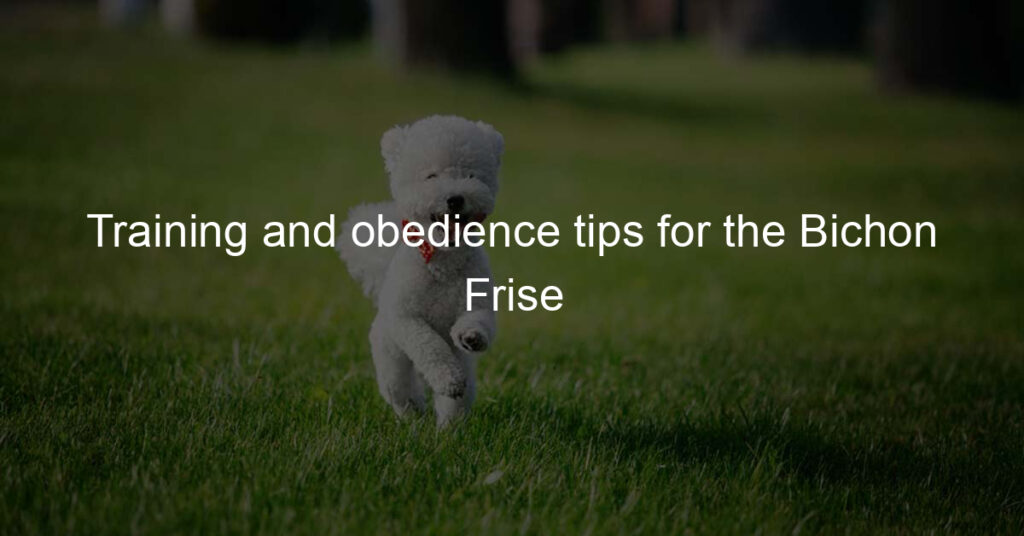Are you ready to have a well-mannered, obedient Bichon Frise? If you’re the proud owner of one of these puppies, then congratulations! You’ve taken on a furry companion who will love and admire you unconditionally. However cute they may look with their fluffy coat, those little bichons can require quite a bit of care and attention—especially when it comes to training.
Training your beloved pup doesn’t have to be an overwhelming or time-consuming process though! In this post we’ll discuss some simple tips for ensuring your bichon is happy and obedient—helps that both men and women alike can benefit from as new dog owners. Keep reading for more information about how best to train your precious bundle of fur!
What is the correct way to obedience train a dog?
The key to obedience training your pup is consistency! Start by establishing rules, boundaries, and expectations. Make sure that you remain consistent with the rewards and punishments applied. You should also make sure that you are firm but gentle while enforcing the rules so that they can learn without feeling scared or overwhelmed.
One thing to keep in mind is that positive reinforcement is usually the best approach when teaching your pup new commands – try using treats to reward them for good behavior or to help them understand a certain command. With patience and dedication, you can successfully obedience train your pooch!
How trainable is a Bichon Frise?
The Bichon Frise is considered an intelligent breed, so they are quite trainable – Plus, they have the bonus of being cute and cuddly too. Training starts right away, teaching the basics like good behavior, housebreaking, and basic commands. As the pup grows, the training continues with leash walking and socialization.
This all-rounder is also capable of more demanding tasks such as agility and competition. With patience and consistency, it can be trained to do all kinds of tricks from rolling over and sitting pretty to playing hide-and-seek! Along with plenty of positive reinforcement in the form of treats – this pup can master many things in no time at all!
How easy is it to train a Bichon?
Training a Bichon can be an incredibly rewarding experience, but it is not always easy. This spunky little breed requires patience and consistency, as they learn best through repetition. With the right dedication to their training, a Bichon can become well-trained and will form a close bond with their handler.
Positive reinforcement techniques are best used when training a Bichon as they tend to respond well to reward-based methods. It is important to keep each training session short and enjoyable for you both, as it will make each future session more successful. Consistency is key when training a Bichon, so be sure to carve out time throughout the week for them to practice their skills.
Why are Bichons so hard to train?
Bichons are known for being particularly difficult dogs to train. They can indeed learn quickly if they have the right approach, but they can also become easily distracted and lose interest in training exercises. Bichons have a strong independent streak, so coming up with clear instructions is essential when trying to get them to focus on completing tasks.
Additionally, these dogs often don’t respond well to corrections and harsh discipline; rather, positive reinforcement strategies tend to work best for offering encouragement and praise. Regular practice is also a must when it comes to training Bichons — consistency will give them less of a chance to get bored or frustrated with the same drills again and again.
How do you calm down a Bichon Frise?
Bichon Frises are known for being high-energy dogs, so calming them down can sometimes be a challenge. Proper exercise and playtime can help significantly in bringing their energy levels down – take them for regular walks and let them run around the yard to get some of that built-up energy out.
Other things that can soothe a Bichon Frise are providing plenty of emotional support, like snuggling and affectionate petting. In times of stress or anxiety, keep your tone soothing and gentle, and try not to shout or yell at the dog as it will most likely increase their fear. You may also find it helpful to distract your pup with a puzzle toy that rewards them with treats – they just might enjoy the attention they’re getting while trying to solve it!
Conclusion: Training and obedience tips for the Bichon Frise
Keeping your Bichon Frise happy and healthy requires consistent training and reinforcement. Proper training can ensure that your Bichon will follow all of your commands during obedience training sessions, as well as throughout their daily life. Start with basic commands such as ‘sit’, ‘stay’, and ‘come’ and progress to more advanced ones like ‘heel’. With proper and consistent reinforcement, you can make sure your furry friend remains a loyal companion for many years to come.
Also, don’t forget to strengthen the bond between both of you through regular playtime and cuddle time! Having someone who loves you unconditionally by your side is always better than being lonely, especially if it’s an adorable ball of fuzz like the Bichon Frise. Give them all the love they deserve, and they will return the favor tenfold!








